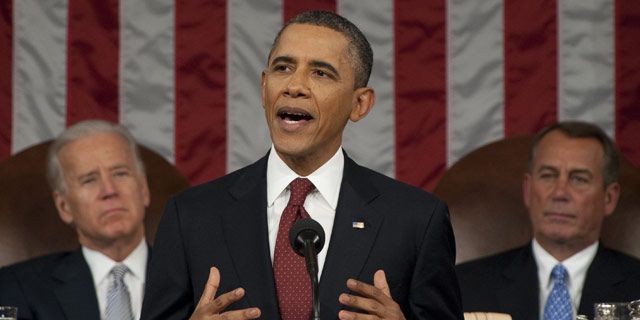You may remember the 2010 State of the Union address and the — shall we say, awkwardness — when President Obama challenged the Supreme Court justices, to their faces, for the Citizens United decision. He called it “wrong” and “bad for democracy,” as Justice Samuel Alito shook his head and appeared to say, “Not true.”

Super PAC watchdogs and campaign transparency advocates at the Sunlight Foundation blogged on Tuesday that they hoped the president might take up the issue again in this election year. They wrote:
“The issue is still rife for Presidential engagement, though — people hate the Citizens United decision, and it should be easy to rail against negative ads and dark money in our elections.
The issue could be awkward for Obama, whose former staffers started their own super PAC to aid in his re-election. Even if Obama and his party are to be the beneficiaries of the often secret, unlimited contributions they have warned us about in the past, the President (sic) still has a responsibility to push the issue.”
Tuesday night, although Obama mentioned the “corrosive influence of money in politics,” he limited his remarks to the money bundlers and lobbyists* — and not the moneymen themselves.
Of course, what presidential address in an election year doesn’t double-serve as a campaign speech? As Doyle McManus writes in The LA Times, this year’s 65-minute speech was a “blue-collar speech, aimed largely at the swing voters Obama most needs to woo — middle- and low-income workers still struggling in the recession’s wake.
“To make his case, Obama even borrowed a few issues from the Republican candidates who have been excoriating him — an entire agenda of economic populism that had, until now, received relatively slight attention from the White House. He called for a new drive to attract manufacturing jobs back from overseas, a major plank of Rick Santorum’s campaign. He promised to get tough on unfair trade practices in China, a major plank of Mitt Romney’s campaign. And he called for much more domestic production of oil and gas, a favorite plank of every Republican’s campaign.”
And when the president wasn’t co-opting GOP policy positions, he seemed to be obliquely dissing them. The New York Times’ Matt Landler observed that Romney “was the unspoken adversary in Mr. Obama’s call for a more equitable society” and that:
“[M]uch of the president’s message was clearly intended to push back at his Republican rivals and their critiques of his record… And he flatly rejected the contention of Mr. Romney, Mr. Gingrich and other Republicans that he is presiding over a country in decline.”
“’Anyone who tells you that America is in decline or that our influence has waned,” the president said, “doesn’t know what they’re talking about.”
*Speaking of lobbyists, Abby Phillips’ piece in Politico about the annual lobbying that takes place around the SOTU is worth reading. And you can see which groups got the nod for inclusion in this Washington Post interactive breakdown that visualizes the speech.

